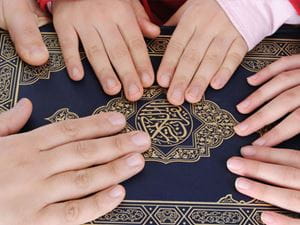
The day my father died my house was filled with people, mostly neighbors and family friends. They sat in a circle on a sheet, which was spread out on the floor of our living room to accommodate their number; and recited verses from the holy Quran. Afterwards, they prayed for forgiveness and an easy passage to the hereafter for my father’s soul. Since then, this ritual has been repeated yearly in our family home. Children from madrasas (schools, with mostly poor children, where Quran and other Islamic tenets are taught) are invited to join my family to recite from the Quran; sheets are spread out on the floor of our living room to make space for them to sit; and prayers are made to send blessings to my father’s soul, that it may find its final abode in Jannah (heaven).
Till the time I lived in Delhi with my mom, I deliberately avoided joining in or being present when this recitation was taking place. I would make up excuses of student projects and deadline and stay out till late. My absence gave the impression that I did not care and sometimes upset my mom who perhaps needed me by her side. The truth is, my father’s sudden death when he was 58 had shaken me to the core.
I did not have it in me to witness a ritual, the sounds and visuals of which, so strikingly reminded me of the day he died.
My father was my rock, he was the ground beneath my feet on which I dug my roots, and he was the roof on my head under whose shelter I grew protected from the fiery elements. As the days passed, all that I had felt on his death, the vulnerability, the sense of insecurity, and the shock, went into a freeze somewhere inside me as I continued moving on in life. To me, the group recitation on his death anniversary seemed like an exhausting practice which thawed raw emotions and did nothing but threaten to pull me down. I failed to understand that why would anyone bring it upon themselves.
This is not to say I did not remember my father. I did. I cherished each and every loving moment I spent with him. But I tried not to dwell on his death. When I thought of him I thought of the good times spent together and the way he used to encourage and guide me. This was good, except that, I still woke up on occasional nights, after some nightmare I could never recall, calling out for him. And my migraines worsened.
I was forced to look inwards and acknowledge the cause of my condition. The answer was obvious. I had developed a fear of losing loved ones to death. I was going on but breaking down; getting clingy when I needed to let go and aloof where I needed to show affection. It got so bad that at one point, I felt completely shattered and alone even though I was surrounded by many who loved me.
It was at this rock bottom that, recalling my mom’s advice, I turned to the words of Allah. In my pursuit to better understand my faith and derive strength from it, I read the meaning of Surah Yaseen, the chapter from the Quran which is read on someone’s death. It was the first time I was reading the English translation of and thus comprehending the verses I had till now only recited in Arabic, a language I can read but not understand (my native language being hindi/urdu).
Exalted is the one (Allah) in whose hands is the realm of all things, and to that being you will be returned.
For days and months, I kept returning to the last part of this verse, repeating it chant-like to myself. It gave me a sense of inevitability of returning to the “one” and I tried to imbibe this feeling into me. Gradually I began to come to peace with the “untimeliness” of my father’s death. My perspective on his death changed from it being a sudden one to a pre-ordained one, and I began to see it as a transition to a better world.
As I continued this journey into self-healing, with the help of particular verses of the Quran, I began to see the group recitation in a different light: as part closure, and part continuation of a connection with the loved one. And more than that, I began to see it as a joint practice in finding solace in remembrance of Allah. The sounds of verses being read aloud, which I used to find unsettling due to the memory connect, now resonated with meaning.
The recitation was a ritual for me when I did not understand it and now that I did, it was an act of worship.
Shazia Javed is a writer, film-maker and photographer. She is also a mom of two lovely children.

